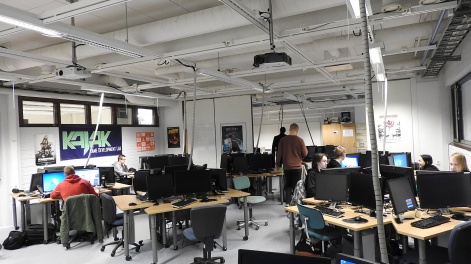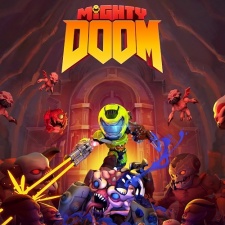Video games. Don't you just love them?
If only that stupid thing called work didn't get in the way! But what if your work IS games…?
From lone indie developers working out of their bedrooms to billion-dollar businesses that span the globe, there's a huge range of roles to fit just about any skill set, from artists, musicians and level designers to people working in retail, law or advertising.
It’s estimated that the UK games-related workforce will soon exceed 47,000 full-time roles, and globally the industry is worth some $170 billion.
The fun part is figuring out where YOU fit in - and then finding that first job.
We could fill a whole book on the subject, but hopefully this article will at least give you a broad overview and be a good primer as you start your journey into games as a career.
People hire people!
The most common approach when job hunting is to keep an eye out for adverts and fire off a CV. Which is fine, but you can improve your chances. There's no substitute for the personal touch, so you should go out of your way to 'meet' people in the games industry. The easiest way to do this is by joining online social groups or forums, but there might be a local meetup you could attend.
The idea is to become a known quantity so that even if it doesn't lead directly to getting hired, your name will stand out from the others in that bulging inbox of applications. It might make all the difference to your success, but you might also learn a thing or two and have fun along the way.
Pocket Gamer Connects events - whether they're live or online - specialise in connecting the global games industry. The clue's in the name, after all… The next one is this April 19-23 and just happens to feature the return of Careers Week, complete with dedicated Discord channels so you can virtually meet publishers, developers, studios and more. It's a great chance to get your name out there and what's more, jobseekers can apply for free access to the whole event using this form.

Recruiters will take you much more seriously than someone who just vaguely says they want to work in games.
Are you experienced?
Okay, so you haven't had a job in games, but that doesn't mean you can't get some experience under your belt.
If you're still at school or college, then take advantage of the work experience programmes to find a placement with a games company. And if your tutor doesn't have any contacts - or isn't interested - there's nothing to stop you organising your own placement.
But there's no age limit on internships. Admittedly, these are almost always unpaid, but instead of using your annual leave to sit in the garden, why not spend it working for a games studio? It's a great chance to see how games are made first-hand and might give you some ideas for how you'd like to get involved professionally.
Or if you'd prefer a less formal approach in your spare time, why not take part in a games jam or get stuck in on your own project? Whether that's learning how to create your own game, writing for your blog or live streaming, the trick is to think about which area you'd like to work in, then find a way to prove that you're passionate about it.
The end result should be something you can show to hiring companies as part of a portfolio. Even if it's not the next Fortnite, you can be sure that recruiters will take you much more seriously than someone who just vaguely says they want to work in games.

A CV with relevant training credits carries more weight than one without.
A qualified success
Sometimes it seems like you need a qualification to be considered for even junior roles, so it's a good idea to get some training. This could be anything from an online course or night school class up to a full degree, but a CV with relevant training credits carries more weight than one without.
Speaking of CVs, tailor it to each job you apply for so that you highlight how your skills, experience and interests align with the needs of the business. Make sure it's well presented, easy to read and there are no mistakes. But most importantly, make sure you send it!
Of course you'll use it to apply for vacancies advertised, but you could also send it on spec to the Careers contact that you'll find on the website for most companies that you'd love to work for.
You'll see ads throughout the year on our very own jobs board, or you can find the latest vacancies first at the PGC Digital Careers Week next week. Jobseekers can apply for free access using this form.
Don't give up if you get an interview but just miss out on landing the gig. Nobody likes to be disappointed, but if you're unsuccessful in an application, try to get feedback from the interviewer. You won't change their mind and humble pie never tastes great, but you might just learn something that makes all the difference next time around.

Suits you!
The games industry is big business these days, with some of the biggest titles needing hundreds of people with very different skill sets to bring them to life. If you're good at drawing, then maybe you should be a character artist - or if you can read the code in the Matrix, then level design might be for you.
Here's a list of some of the most popular job titles and specialisms just to give you some ideas for where you might fit in.
- Animator
- Artist (character, environment, concept, lighting, storyboard, technical, VFX)
- Business development
- Community manager
- Composer
- Customer services
- Designer (game, gameplay, level, narrative, sound, UI/UX)
- Developer
- Dev Ops
- Economy designer
- Esports (event management, pro gamer, shoutcaster/commentator)
- Finance (accountant)
- Human resources/personnel
- IT
- Journalist
- Lawyer
- Live Ops
- Localisation
- Marketing
- Office manager
- Personal assistant
- Playtester
- PR
- Producer
- Programmer (AI, engine, gameplay, graphics, network, physics)
- Project Manager
- Publisher
- Quality Assurance (QA) testing
- Receptionist
- Social media manager
- Voiceover artist

Want to speak with people that work in games, recruiters and studios looking for new talent?
Get your games career off the ground NEXT WEEK!
Want to speak directly with people that already work in games, recruiters and studios looking for new talent right now? Want to do all that FREE?
The next Careers Week is next week as part of Pocket Gamer Connects Digital #6, April 19-23. You'll find seminars about getting that job, as well as daily recruitment hours on our dedicated Discord channel and a Games Jobs Live stream too.
We're making a number of jobseeker tickets available FREE to those who are currently looking for a new role. This will not only give you access to the specific recruitment opportunities, but also all other aspects of the Pocket Gamer Connects online event (including five days of professional talks via Zoom, the MeetToMatch meeting platform and more). If you think you qualify, sign up here.





















